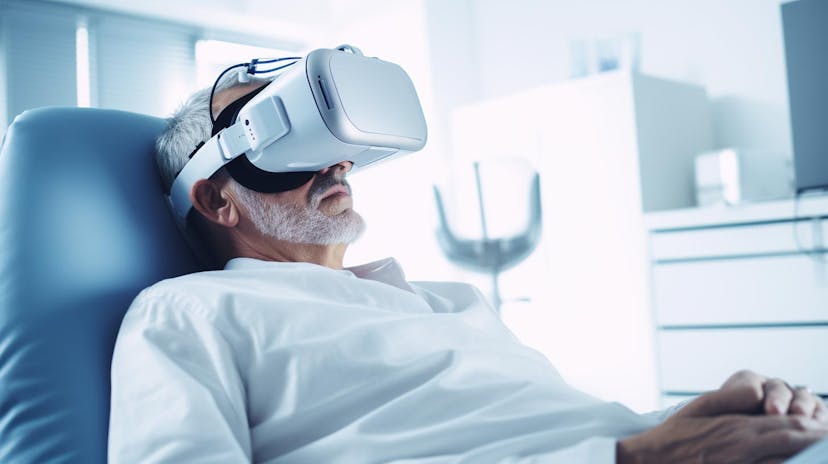
Modern eye care fused with advanced technology and medical expertise has given rise to a transformative approach to treating eye conditions. Biometry, a scientific discipline that harnesses statistical methods and precise measurements, stands as a cornerstone in this evolution. With its ability to capture intricate details of the eye's anatomy and function, biometry has become an indispensable tool in diagnosing, planning, and executing treatments for various ocular ailments.
By delving into the depths of ocular structures, analysing refractive errors, and evaluating the subtleties of the eye's dimensions, biometry paves the way for personalised and targeted interventions. Let’s explore how biometry's intricate insights are shaping a new era of precision-driven treatments, ensuring that each patient's journey toward optimal vision is marked by accuracy, innovation, and improved outcomes.
Biometry is extensively used in the field of ophthalmology to assess, diagnose, and treat various eye conditions.
Intraocular Lens (IOL) Power Calculation
Biometry is crucial in determining the correct power of intraocular lenses that are implanted during cataract surgery or refractive lens exchange. Precise measurements of the eye's axial length, corneal curvature, and anterior chamber depth are taken using biometric devices to calculate the appropriate IOL power, ensuring accurate vision correction after the procedure.
Corneal Measurements
Biometry is used to measure corneal curvature and thickness, which are vital for diagnosing conditions like astigmatism and keratoconus. These measurements aid in planning refractive surgeries like LASIK or PRK.
Glaucoma Assessment
Biometry plays a role in evaluating the angle of the anterior chamber of the eye, a critical factor in diagnosing and managing glaucoma. This helps in determining the risk of angle closure and guiding treatment decisions.

Ocular Biometry for Myopia Control
Biometry is used to monitor the progression of myopia (nearsightedness) and assess its impact on the eye's structures. This information helps in implementing interventions to slow down myopia progression, such as orthokeratology lenses or pharmaceutical treatments.
Corneal Biomechanics
Biometric analysis is used to evaluate the biomechanical properties of the cornea, which is essential for understanding conditions like keratoconus and evaluating the suitability of corneal surgeries.
Retinal Imaging and Thickness Measurements
Biometry is employed in imaging techniques like optical coherence tomography (OCT) to visualise the layers of the retina and measure retinal thickness. This aids in diagnosing and managing retinal conditions like macular degeneration, diabetic retinopathy, and retinal detachment.
Pupil Dynamics and Aberrometry
Biometric devices can analyse pupil dynamics and aberrations in the eye, which provide insights into higher-order refractive errors and guide customised vision correction treatments.
Biometric Monitoring of Eye Health
Some biometric devices can monitor changes in the eye's structures over time, helping to detect early signs of conditions like glaucoma, macular degeneration, or diabetic retinopathy.
Overall, biometry plays a critical role in ophthalmology by providing precise measurements and data that ophthalmologists use to diagnose various eye conditions, plan treatments, and monitor the progress of eye health over time. It enables more accurate and personalised care for patients with a wide range of ocular conditions.

What Does The Future Hold For Biometric Vision Correction?
The future of biometry-driven vision correction holds immense promise, driven by technological advancements, innovative approaches, and a growing understanding of individualised eye care. Discover some exciting possibilities and trends for the future of biometry-based vision correction:
- Enhanced Personalisation
Biometry's ability to gather detailed information about a patient's eye structure and refractive errors will lead to increasingly personalised treatments. Advanced algorithms and artificial intelligence will analyse this data to tailor vision correction procedures to each patient's unique needs, optimising outcomes and minimising side effects.
- Minimally Invasive Procedures
Biometry will contribute to the development of even less invasive and more precise procedures for vision correction. Techniques such as femtosecond laser-assisted surgery and small-incision procedures will continue to evolve, allowing for faster recovery and better outcomes.
- Customised Multifocal Solutions
Biometry will play a pivotal role in creating customised multifocal and accommodative lenses, catering to the needs of individuals with presbyopia and other refractive issues. These lenses will provide clear vision at various distances and adapt to the eye's changing needs.
- Early Detection and Prevention
Biometric technologies will enable early detection of various eye conditions, such as keratoconus, glaucoma, and macular degeneration. Early intervention based on biometric data will allow for timely treatment and better preservation of vision.
- Integration with Wearable Tech
Biometric measurements may become integrated with wearable devices, enabling individuals to monitor their eye health continuously. These devices could provide real-time feedback on visual changes and prompt users to seek professional care when necessary.
- Non-Invasive Refractive Monitoring
Non-invasive biometric techniques could emerge for monitoring refractive errors and eye health over time. This could lead to more personalised and timely adjustments to vision correction methods.

- Gene-Based Interventions
Biometry's synergy with genetics and genomics could pave the way for gene-based interventions in vision correction. Gene therapies and personalised treatments may address underlying genetic factors contributing to refractive errors.
- Improved Postoperative Management
Biometry-driven postoperative monitoring will become increasingly sophisticated. Remote monitoring, telemedicine, and virtual follow-ups based on biometric data will streamline aftercare and ensure optimal recovery.
- Regenerative Therapies
Biometric insights might facilitate the development of regenerative therapies that repair or replace damaged ocular tissues, potentially reversing certain refractive errors and age-related visual changes.
- Global Accessibility
As biometric technologies become more refined and accessible, vision correction procedures that rely on biometry will reach a wider global audience, contributing to improved eye health on a global scale.
The future of biometry-driven vision correction holds transformative potential, from highly personalised treatments and non-invasive monitoring to gene-based interventions and regenerative therapies. With ongoing research, technological innovation, and collaborative efforts between ophthalmologists, researchers, and technology developers, biometry will continue to shape the landscape of vision correction, offering patients improved outcomes and a clearer, more vibrant world.
Experience a New Era of Vision Enhancement with My-iCare!
Are you ready to witness the future of eye care? At My-iCare, we're redefining laser eye surgery and cataract treatment using the power of biometry and cutting-edge technology. Our commitment to your vision goes beyond traditional approaches – we're introducing a transformative journey that seamlessly integrates precision biometric measurements into every step of your treatment.
Discover the Difference:
Personalised Precision
With biometry at our core, we capture the intricate details of your eye's structure and refractive errors. This wealth of data empowers us to tailor your treatment to your unique needs, ensuring exceptional outcomes and minimal discomfort.
Advanced Laser Solutions
Our state-of-the-art laser technologies, guided by biometric insights, offer unparalleled accuracy and safety. Whether it's LASIK for refractive correction or cataract removal, our procedures are at the forefront of innovation, promising improved clarity and a renewed outlook on life.
Data-Driven Excellence
Biometry isn't just a tool for us – it's the foundation of your journey. From pre-operative assessments to post-operative monitoring, we use biometric data to optimise every phase of your treatment, enhancing your comfort, recovery, and overall satisfaction.
Global Standards, Local Care
My-iCare brings the world-class standards of biometry-driven eye care right to your doorstep from its London location. Our expert team, combined with the latest technology, ensures you receive top-tier treatment without leaving your community.
Embrace Tomorrow's Vision Today – Book Your Consultation! Step into a world where precision meets possibility. Take the first step towards a clearer, brighter future by scheduling a consultation with My-iCare. Let us show you how the fusion of technology and biometry can transform your vision journey. Your eyes deserve nothing but the best – experience the My-iCare difference today!"
Find out more by Speaking to our team









